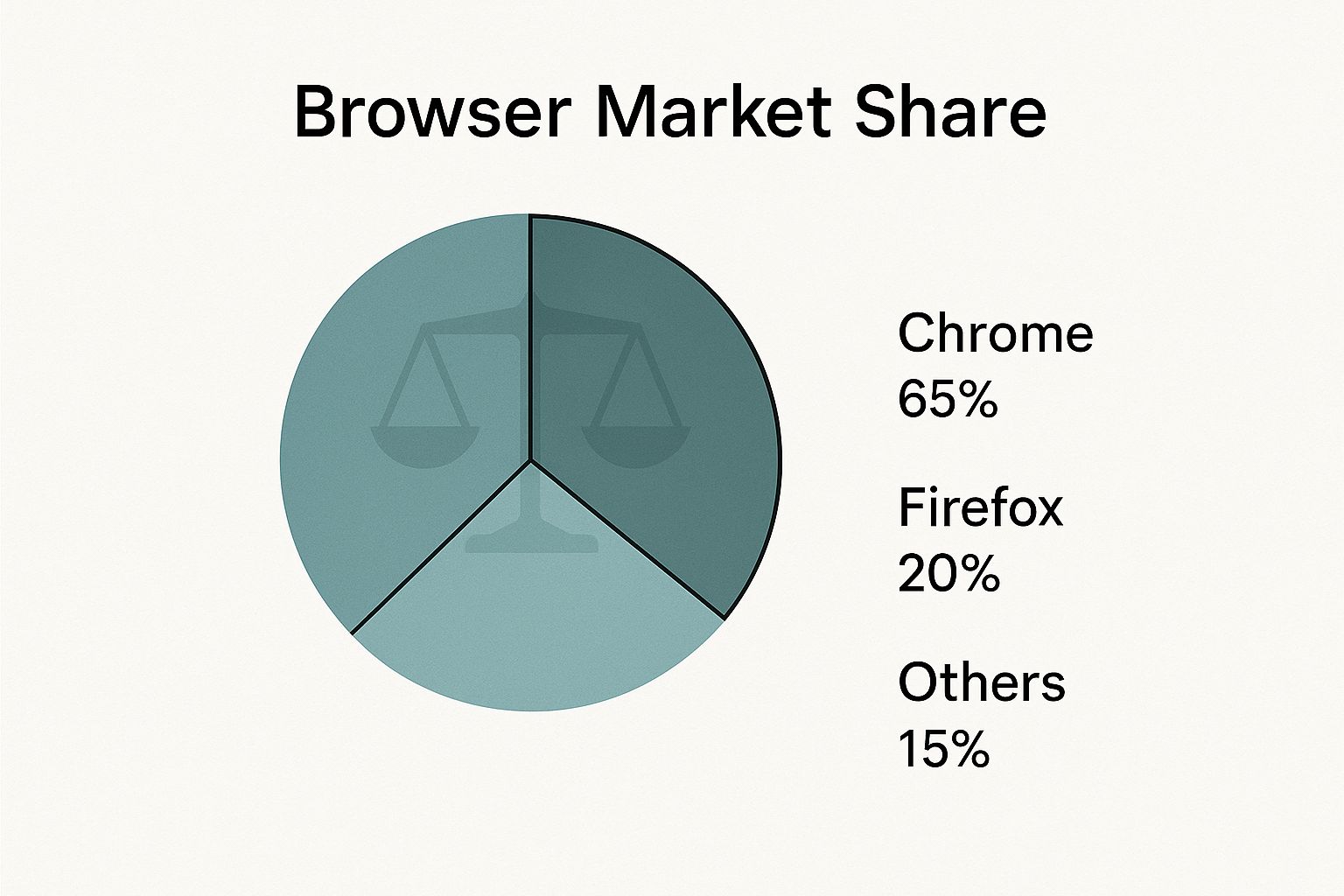At its core, forex in South Africa is all about buying and selling different currencies. For any local business that imports materials or gets paid for exports, it’s the lifeblood of their international operations. This is the system that plugs our economy into the rest of the world, and its effects ripple through everything from the price you pay for petrol to the cost of that software subscription from overseas.
Getting your head around how this all works is crucial for any South African business with global ambitions.
Understanding Forex in a South African Context
Picture the foreign exchange (or forex) market as a gigantic, sprawling bazaar. But instead of spices or textiles, currencies are what’s being traded. For a South African business, this isn't just an abstract financial idea; it’s part of the daily grind.
When a company in Cape Town needs to buy machinery from Germany, for instance, they can't just pay in Rand. They have to swap their ZAR for Euros. That single transaction is a tiny piece of the colossal global forex market.
The catch is, the Rand's value is never still. It’s constantly shifting, pushed and pulled by a few key factors unique to our position in the world:
- Commodity Prices: South Africa is a powerhouse exporter of resources like gold, platinum, and coal. When the global prices for these commodities climb, international demand for the ZAR tends to follow suit, giving our currency a boost.
- Economic Stability: The health of our own economy plays a massive role. Things like inflation, interest rates, and political stability directly influence how confident foreign investors feel about putting their money here, which in turn affects the Rand's strength.
- Global Market Sentiment: The ZAR is an emerging market currency, which means its fate is often tied to the global appetite for risk. When things get shaky on the world stage, investors tend to retreat from what they see as riskier assets (like the Rand) and flock to "safe-haven" currencies like the US dollar.
The Rand's Volatility in Practice
This constant push and pull makes the South African Rand one of the most traded currencies on the continent, but also one of the most unpredictable. Just look at its recent performance to see how much it can swing.
The ZAR saw some serious movement against the US dollar, at one point weakening to a high of around 19.93 ZAR/USD before bouncing back to roughly 17.61 ZAR/USD just a few months later. Interestingly, despite global economic headwinds, the rand actually strengthened by about 1.42% over the previous year. Forecasts are now suggesting we might see an average rate of around 18.82 against the dollar for 2025. You can dig deeper into these trends with a detailed South Africa economic outlook.
This is precisely why managing forex in South Africa is so vital for businesses. An unexpected dip in the Rand’s value can make your import costs soar overnight, putting a serious squeeze on your profit margins.
Getting to Grips with South Africa's Forex Regulations

Sending money out of South Africa isn’t as simple as just clicking a button. The country has a system of exchange controls, which are basically the rules of the road for moving capital across its borders. This isn't just bureaucratic red tape; these regulations are in place to protect the national economy and manage the value of the Rand.
The South African Reserve Bank (SARB) is the main regulator here, setting the rules for every foreign exchange transaction. You can think of the SARB as the guardian of the country's financial stability. The rules they create are then enforced by authorised dealers—which are almost always the major banks.
So, why all the fuss? The main reason for these controls is to stop huge, sudden outflows of money that could throw the economy off balance. By carefully managing the flow of capital, the SARB ensures South Africa keeps enough foreign currency in its back pocket. These reserves act as a critical safety net, propping up the Rand and making sure the country can pay for all its essential imports.
Know Your Limits: Allowances Explained
For both individuals and businesses, these rules boil down to specific annual allowances. If you’re dealing with forex in South Africa, getting these limits right is the first step to staying on the right side of the law.
There are two main allowances you need to know about:
- Single Discretionary Allowance (SDA): This is your personal allowance. Every South African resident can send up to R1 million abroad each calendar year for almost any reason—like a holiday, gift, or online shopping—without needing a tax clearance certificate.
- Foreign Investment Allowance (FIA): If you're looking to make bigger moves, like buying property or shares overseas, this allowance lets you transfer an extra R10 million per year. But for this one, you'll need to get a Tax Compliance Status (TCS) pin from SARS.
It's easy to think of these as just personal limits, but they're much more than that. These allowances create the entire regulatory world that businesses have to work within. For any company making international payments, compliance is a non-negotiable part of the strategy.
These rules have a direct impact on the country's economic health. As a real-world example, in January 2025, South Africa's foreign exchange reserves were sitting at around $47.9 billion, which was enough to cover about 5.4 months of imports. If you’re interested in the numbers, you can explore more detailed data on South Africa's foreign exchange reserves to see how these figures change over time.
Choosing Your Forex Provider: Banks vs. Fintechs
When your South African business needs to handle foreign exchange, you're faced with a big decision: where do you go? The choice really boils down to two main camps: the traditional banks we all know and the new-school fintech companies shaking things up. Each has a completely different way of approaching international payments.
For years, the big banks like FNB or Standard Bank were the only game in town. They offer that feeling of old-school security and familiarity. Their brick-and-mortar branches and long-standing reputations give a sense of comfort that many business owners still value.
But that traditional path often has its downsides. Think less-than-great exchange rates, transactions that can take days, and a fee structure that isn't always crystal clear.
The Rise of Fintech Alternatives
This is where fintech providers saw their opening. They've built their businesses by tackling those exact frustrations head-on. By operating almost entirely online, they slash their overheads, which means they can often pass those savings on to you with better rates and faster, more intuitive digital platforms.
The real difference often comes down to transparency and cost. Banks tend to bake their profit into the exchange rate itself (the spread), while many fintechs give you the real mid-market rate and charge a simple, upfront fee. This makes it much easier to know exactly what you're paying.
The South African Reserve Bank (SARB) and the Financial Sector Conduct Authority (FSCA) keep a close watch on everyone in this space, from the big banks to the licensed fintechs. This oversight is crucial for a stable financial environment.

This just goes to show how important it is to pick a provider that’s not just cheap, but also fully compliant with South African financial law. Getting a handle on the broader financial world is always a good idea; you can find more information on how various lenders, including fintechs, operate.
To help you weigh your options, let’s break down the key differences.
Forex Provider Comparison for South African Businesses
| Feature | Traditional Banks (e.g., FNB, Standard Bank) | Fintech Forex Providers (e.g., Payoneer, Wise) |
|---|---|---|
| Exchange Rates | Typically include a wider spread (markup) over the mid-market rate. | Often provide rates at or very close to the mid-market rate. |
| Fees | Can have multiple fees (transfer, receiving, correspondent bank fees) that may not be obvious upfront. | Usually a single, transparent percentage or flat fee stated clearly before you transact. |
| Transfer Speed | Standard international transfers (SWIFT) can take 2-5 business days. | Often much faster, with many transfers completing within hours or by the next business day. |
| Platform & UX | Online banking portals can be complex and may require in-person branch visits for some tasks. | Sleek, user-friendly digital platforms and mobile apps designed for a smooth online experience. |
| Customer Support | Access to branch staff and call centres, but can involve long wait times. | Primarily online support (chat, email), which is often faster but lacks a face-to-face option. |
| Account Integration | Well-integrated with existing business bank accounts and other traditional banking products. | May require setting up a separate multi-currency account, but integrates well with accounting software like Xero. |
Ultimately, there’s no single "best" choice for everyone. Your decision will hinge on what your business values most. Is it the established trust of a traditional bank, or do the speed, savings, and clarity of a fintech solution better suit your needs?
Uncovering the Real Cost of Forex Transactions

Here’s the first thing any experienced business owner learns about international payments: the exchange rate you see on Google is almost never the rate you actually get. It's a hard truth, but behind every single forex transaction, there are layers of costs that can silently chip away at your profits.
The main culprit is something called the exchange rate spread. You can think of it as a hidden service fee. Your provider buys a currency at one price (the wholesale rate) and then sells it to you at a slightly less favourable one. That tiny gap is their profit, and when you're moving thousands of Rands, it adds up fast.
More Than Just the Rate
But the spread is just where the costs begin. A whole host of other fees can quickly pile on, making the total cost of your transaction much higher than you initially budgeted for.
Here are some of the usual suspects:
- Commission Fees: This is a straightforward charge for the service of converting your currency, and it can be either a flat fee or a percentage of the total amount.
- SWIFT Fees: Using the global SWIFT network to wire money between banks isn't free. These charges often fall somewhere between R250 and R500 for each transfer.
- Receiving Bank Fees: Just when you think you've paid all the fees, the recipient's bank might charge them simply for receiving the funds on their end.
Let's put that into perspective. Say your business needs to pay a supplier R100,000 in the US. A seemingly small 2% spread instantly shaves R2,000 off your payment. Tack on another R500 for SWIFT fees, and you're down R2,500 before the money has even left the country.
While these direct expenses are the most obvious, it's also wise to keep an eye on indirect costs. For instance, understanding chargeback fees is crucial for getting a complete picture of your financial risks when dealing with cross-border payments.
On a broader scale, a country's financial stability often hinges on its foreign reserves. By mid-2025, South Africa's gross foreign exchange reserves reached a new high of around $68.415 billion, thanks to increases in foreign currency holdings and Special Drawing Rights. This sizable buffer is key to weathering external economic shocks and maintaining financial resilience.
Smarter Forex Strategies for Local Businesses
For any South African business trading internationally, just absorbing high forex costs is no longer a viable strategy. The Rand's notorious ups and downs demand a much sharper approach. Thankfully, modern fintech solutions have levelled the playing field, giving smaller businesses powerful tools that were once the exclusive domain of large corporations.
Hold Foreign Currency to Your Advantage
One of the most practical tools at your disposal is a multi-currency account. This is exactly what it sounds like: an account that lets your business hold, send, and receive funds in currencies like US Dollars or Euros without immediately converting them back to Rand.
Imagine your company exports products and gets paid $10,000. With a typical bank account, that payment is forced into ZAR at whatever the rate is on that day—good or bad. A multi-currency account, on the other hand, lets you keep those dollars. This gives you the power to wait and convert them back to Rand only when the exchange rate is in your favour.
Lock in Rates to Eliminate Uncertainty
Another crucial strategy for managing forex in South Africa is hedging. It might sound complicated, but the principle is actually quite simple: it’s all about removing future uncertainty from your books.
The most common way to do this is with a forward contract. Think of it like pre-ordering your currency at a set price. If you know you have to pay an overseas supplier $50,000 in three months' time, you can agree on an exchange rate with a provider today and lock it in for that future date.
- Benefit: You know your exact ZAR cost well in advance, making budgeting far more accurate.
- Protection: Your profit margins are shielded from any sudden, nasty swings in the Rand.
This simple move transforms a volatile, unknown future cost into a fixed and predictable expense. It’s an incredibly effective way for businesses to protect themselves from the ZAR’s volatility, ensuring one bad week on the market doesn’t wipe out a whole quarter’s profit.
These strategies aren't just for the big multinational players anymore. Fintech platforms like Zaro are bringing these tools to small and medium-sized businesses, offering real exchange rates and multi-currency accounts without the usual banking bureaucracy and high fees. By embracing these smarter forex methods, local businesses can compete far more effectively on the global stage.
Got Forex Questions? Here Are Some Straightforward Answers
Dipping your toes into the world of foreign exchange in South Africa can feel a bit confusing at first. Whether you're running a business or just handling personal funds, you'll inevitably have some practical questions. Let's clear up a few of the most common ones.
Do I Have to Pay Tax on Forex Gains in South Africa?
Yes, you absolutely do. The South African Revenue Service (SARS) views any profit you make from foreign exchange as taxable income. This isn't just for big corporations; it applies to individuals too.
So, if you buy US dollars and the Rand weakens, the "paper gain" you've made becomes real income when you convert it back or use it. That's why keeping meticulous records of every transaction—dates, rates, and amounts—is non-negotiable for staying on the right side of SARS.
How Can I Be Sure a Forex Provider Is Legit?
This is a crucial question, and the answer is your first line of defence against scams. In South Africa, any company dealing in forex has to be officially recognised. They must either be licensed as an Authorised Dealer by the South African Reserve Bank (SARB) or registered with the Financial Sector Conduct Authority (FSCA).
Before you even think about sending money, find the provider's FSCA licence number on their website. Then, head over to the official FSCA portal and verify it. This one small check could save you a world of trouble.
When Is the Best Time to Transfer Money?
Honestly, trying to time the market perfectly is a bit of a guessing game, especially with the Rand's notorious volatility. Exchange rates can swing wildly based on anything from a local news headline to a global economic announcement.
A much more reliable approach, particularly for businesses, is to take the guesswork out of the equation. Instead of trying to predict the future, you can use a financial tool like a forward contract. This lets you lock in today's exchange rate for a payment you need to make weeks or months from now. It provides certainty and protects your budget from any nasty surprises if the market moves against you.
Ready to take control of your international payments? Zaro offers real exchange rates with zero spread and no hidden fees, giving your business the clarity and savings it deserves. Stop losing money to bank markups and start managing your forex with confidence. Learn more at Zaro.
